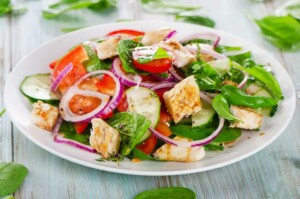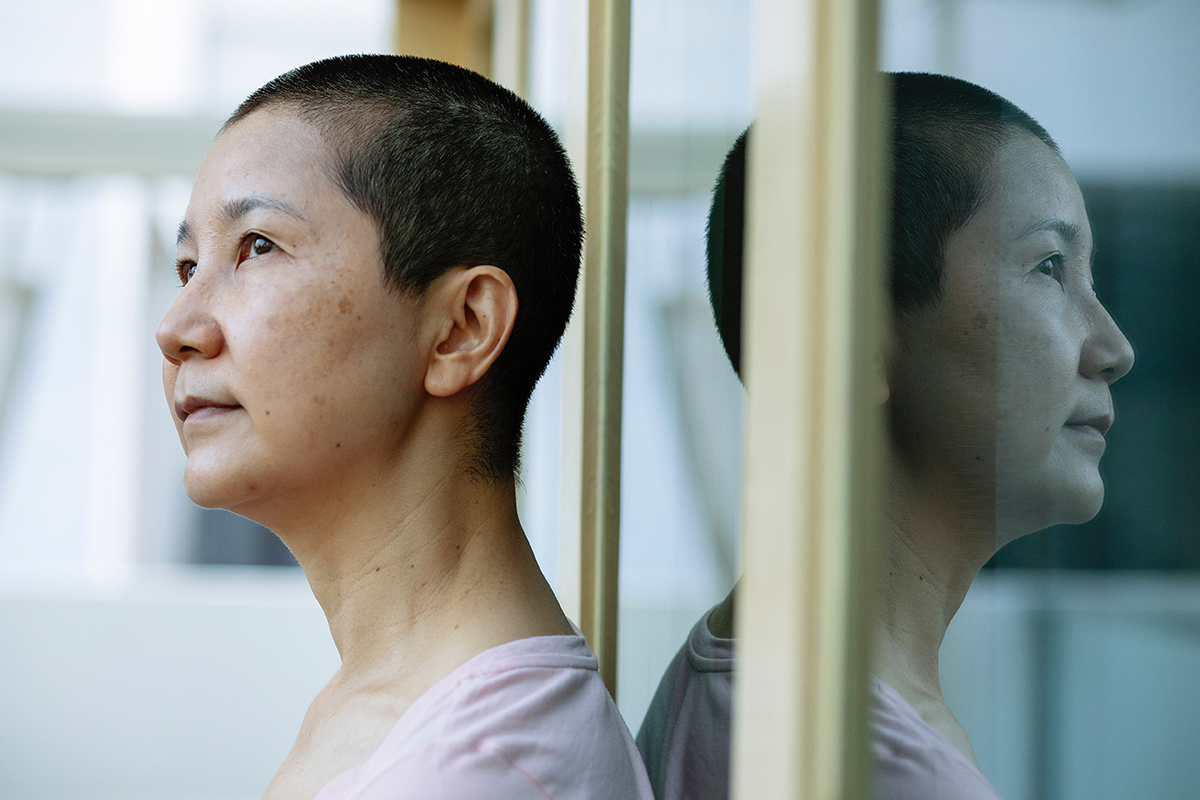
Many ovarian cancer patients and survivors wonder what the ideal diet for ovarian cancer may be. In a nutshell – there is no simple answer.
In this article, adapted from a presentation given by expert Cara Anselmo, Clinical Dietitian-Nutritionist at Memorial Sloan Kettering Cancer Center at OCRA’s 2022 Ovarian Cancer National Conference, you will learn why no one diet fits all.
In fact, Ms. Anselmo underlines that diet can look very different from patient to patient depending on one’s individual treatment and survivorship. An “ideal” diet is one that is individualistic and meets one’s particular nutritional needs and goals, whether that be managing side effects from treatment or maintaining a healthy diet post-treatment. Below, we address some of the common questions about diet posed by ovarian cancer patients and survivors.
Are there foods that prevent or fight ovarian cancer?
Although it would be reassuring to know the foods we eat are actively preventing or fighting cancer, research has yet to show any one individual food or supplement’s ability to prevent or fight ovarian cancer. Additionally, there are no foods that have been found to cause ovarian cancer. This doesn’t negate the fact that being concious about the foods we eat during treatment and survivorship can have risk-reducing benefits and contribute to progression-free surivival. Ms. Anselmo notes that instead of focusing on any one food, it’s “overall dietary patterns that are most important” in maintaining health and reducing risk of recurrence or future primary cancers.
How can I boost my immune system while undergoing chemotherapy or other treatments?

The immune system is intricate and complex, and it works best when we maintain a balanced diet rich in fresh and whole foods. Creating a diet that delivers enough needed nutrients and vitamins to our bodies, while also ensuring that the food we eat is safe, is especially important for cancer patients.
Plants, proteins, sleep and exercise
We can optimize immune function by ensuring we fuel it with enough plant- and protein-based foods and ensure our bodies are getting adequete sleep and exercise. Plant-based foods – such as citrus fruits, garlic, nuts, seeds, spinich, melon, dried herbs and spices, berries and mushrooms – are important for immune function. A healthy immune system also feeds off of protein. Ms. Anselmo recommends adding foods rich in proteins like fish, tofu, beans, and eggs, to your diet. But it’s not just the food we eat – immune systems need enough sleep and exercise. The CDC recommends getting at least seven to eight hours of sleep each night. Small amounts of moderate exercise every day have been shown to help our immune systems perform at their best. This doesn’t have to be rigourous workouts; it can be going for a walk or walking up and down a flight of stairs a few times each day. While the CDC recommends 30 minutes of movement a day, it is important to choose exercises and movements that are medically appropriate.
The importance of food safety
The way we handle our food can be just as important as the food we put into our bodies, especially during cancer treatment. Certain cancer treatments can weaken our immune systems, making food safety and sanitation an important priority. Ms. Anselmo reminds us that basic sanitation like washing hands before prepping a meal and thoroughly rinsing fresh fruits and vegetables with water are little things that can help protect health. On top of employing these simple habits, it may be best to avoid raw or unpasteurized foods such as raw meats, raw-milk cheese, kombucha or sushi while undergoing treatment.
Visit the FDA’s article on food safety for more tips.
Supplements and immune health
Pharmacy shelves are stocked full of supplements claiming to give our immune systems a boost, however “most of these are more marketing than science” says Ms. Anselmo. The American Institute for Cancer Research emphasizes it’s best to get your nutrients from diet as much as possible, as some supplements can pose certain risks and interfere with treatments such as chemotherapy or radiation. Although it’s best to tread with caution when it comes to supplements, Ms. Anselmo does note that many individuals can be at risk of vitamin D deficiency. It is important to get vitamin D levels checked and supplement appropriately in consultation with a medical professional.
What foods should I avoid while on chemotherapy or undergoing other treatment?
“Can I eat pizza?” “Should I go vegan or vegetarian?” “Should I avoid sugar?” “Can I eat red meat?” These are common questions often asked by cancer patients. And while Ms. Anselmo emphasizes that “too much of anything can be a bad thing,” she also underscores that a very restrictive diet can be more harmful than helpful. Here are her suggestions of foods that cancer patients should consider minimizing.
Red meats and cold cuts
Optimal dietary patterns minimize red meats. “Anything that has four legs is considered a red meat, nutritionally speaking,” says Ms. Anselmo. She especially recommends minimizing cold cuts and processed meats like pepperoni, sausage, ham, bacon, and hot dogs. Mayo Clinic suggests adding meat in small portions to a plant-based meal or substituting plant proteins for meat in typical meat-centric dishes. This could look like putting steak slices on a salad or substituting refried beans for beef in tacos.
Added sugars
“Added sugar isn’t just the sugar you add to your coffee, but the sugar you find in your baked goods, and your sweets,” Ms. Anselmo says. And while she suggests that these food items don’t have to be thrown out of our diets, limiting intake of baked goods, cookies, ice cream, and sweetened drinks like soda can support overall health. Overconsumption of food items with added sugars can contribute to obesity, which has been linked to cancer, and added sugars also undermine foods that can have a protective effect against cancer.
Alcoholic drinks
The ACS reports that high levels of alcohol intake have been associated with different cancer risks, due in part to how alcohol breaks down in the body. Excess alcohol consumption can also weaken the immune system. Therefore, Ms. Anselmo suggests being mindful of and minimizing intake of beer, wine, or liquor as part of overall healthy dietary and lifestyle patterns.
So, what is the optimal diet for ovarian cancer?
An optimal diet for patients and survivors is one that serves one’s own individual nutritional needs. A diet for patients currently in treatment may look different than for those who have just finished treatment or are long-term survivors. Following are Ms. Anselmo’s key recommendations for establishing a healthy and balanced dietary pattern and optimizing nutrition during and after ovarian cancer.
Being plant-forward
While you don’t have to go vegetarian or vegan, Ms. Anselmo recommends a diet that is plant-based. “Make plants the star of your plate instead of starting with an animal protein.” She suggests making vegetables, fruits, beans, nuts, and grains such as whole wheat, oats, brown and black rice, and quinoa the basis of your meal. Some patients might ask if they should buy organic produce. Research does not suggest a link between choosing only organic foods and reduced cancer risk. Ms. Anselmo emphasizes incorporating as much fresh produce and plant-based foods into the diet as possible, and not feeling limited to only eating organic foods or produce.
Don’t forget about hydration
Hydration is always important, but it can play a key role in optimizing treatment effectiveness and managing side effects like constipation and diarrhea. Ms. Anselmo recommends at least two liters of water a day, which can include other drinks like plain seltzers, sparkling or mineral waters, hot teas or cocoa, and unsweetened iced teas. Adding lemon, lime, cucumber, or mint to water and drinking through a straw can help facilitate intake while adding flavor. She reminds us that hydration can also come from foods like frozen fruit pops or sorbet, and fruits and veggies with high water content like apples, watermelon, and cucumbers.
Can diet help manage cancer treatment-related side effects and symptoms?
Ms. Anselmo discusses ways our diet can help alleviate some of the common side effects of treatment such as constipation, diarrhea, nausea, changes in taste, mouth sores, loss of appetite, and fatigue.
Constipation and diarrhea
For those experiencing diarrhea, Ms. Anselmo advises limiting raw vegetables, fruit juices, and fried, greasy, or oily foods. Instead, she suggests trying small portions of well-cooked vegetables and fresh or canned fruits in addition to other soluble-fiber rich foods such as oatmeal and bananas.
If diarrhea symptoms are acute, plain cooked white rice, boiled chicken, mashed banana, applesauce, and cooked egg whites can be helpful in temporarily mitigating symptoms.
If experiencing constipation, it is important to gradually increase fiber intake. Fiber-rich foods can include whole grains like bran and quinoa; vegetables such as broccoli, artichokes, and carrots; fruits including berries, pears, avocado and apples; and beans such as lentils and chickpeas. Ms. Anselmo recommends limiting refined carbohydrates like white rice, white bread, and other white-flour products.
Whether experiencing constipation or diarrhea, it is important to get enough hydration. If experiencing diarrhea, Ms. Anselmo recommends trying electrolyte-rich fluids. Additionally, soluble fiber supplements can be helpful in alleviating both constipation and diarrhea.
Nausea
Trying foods or drinks that are cool, cold, or frozen – such as smoothies or fresh fruits like watermelon, sliced apples, or strawberries – can help combat nausea. Additionally, bland foods like potato chips, saltine crackers, or dry toast – while not substantial long-term – can be helpful in managing acute symptoms. Ms. Anselmo encourages eating and drinking several smaller snacks throughout the day instead of focusing on a large meal, and limiting time spent in the kitchen or preparing food.
Changes in taste
Some patients may experience changes in taste, including a metallic taste in the mouth. Ms. Anselmo recommends adding flavors such as lemon, lime, or mint to water and small amounts of salt, sugar, honey, or fresh and dried herbs to foods. Using a wooden or plastic utensil may also help counter a metallic taste.
Mouth sores
Cool, creamy, soft, and bland foods like yogurt or homemade smoothies and shakes can facilitate the healing of mouth sores. Additionally, Ms. Anselmo recommends trying baking soda or saline mouth rinses. She advises against consuming very hot, spicy, or acidic drinks and foods such as citrus or tomato sauce, as well as foods with jagged pieces or sharp edges like hard pretzels or granola.
Loss of appetite and interest in food
When it comes to loss of appetite, Ms. Anselmo suggests trying different flavors, textures, and temperatures to see what is most appealing. Prioritizing high-protein foods such as eggs, beans, yogurt, peanut butter, and fish is important. Using protein-rich nutrition supplement drinks or making homemade shakes and smoothies can be helpful if it is easier to drink than to eat solid foods. Ms. Anselmo gives a reminder that it is ok to choose favorite foods or foods that are most appealing and to not force any particular food. The goal is to get enough nourishment in a way that is most comfortable and tolerable to you.
Fatigue
To manage fatigue, Ms. Anselmo recommends to “keep it simple.” She suggests having easy-to-prep foods on hand such as yogurt cups, instant oats, canned tuna or salmon, frozen vegetables, or already prepared foods. Even though it may sound counterintuitive, limiting caffeine to the early part of the day and drinking it in moderation can help mitigate fatigue and facilitate healthy sleeping patterns. Ms. Anselmo advises against skipping meals and emphasizes the importance of hydration in combatting fatigue.
As with any medical or dietary advice, it is important to talk with your healthcare professional about any individual concerns.


